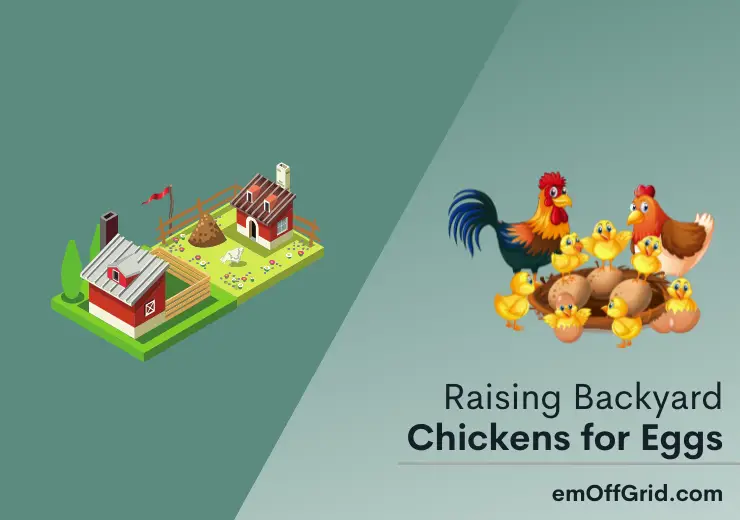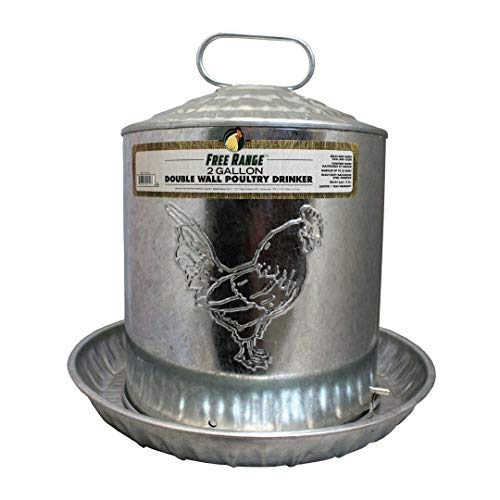Raising backyard chickens for eggs is straightforward and beneficial in many ways. It suits an off-grid lifestyle, and you can use the eggs in different recipes. Besides, they are nutritious and healthier than store-bought eggs.
Raising backyard chickens can be challenging for beginners. You have to consider many factors, including local laws. At the same time, you have to be at peace with your neighbors.
Read on to find out everything you need to raise backyard chicken for eggs. This post covers A-Z of this practice and provides tips on how to stay safe from any associated risks!
Contents
Benefits of Backyard Chickens
Raising backyard chicken is beneficial to you as an off-gridder. It is also a food and income source if you sell extra eggs.
Raising backyard chickens ensures you have a constant supply of fresh eggs. Whether you opt for the free-ranging or caging method, your chickens will lay enough eggs to feed your family. Besides, eggs are nutritious and a rich source of protein for supplementing your diet.
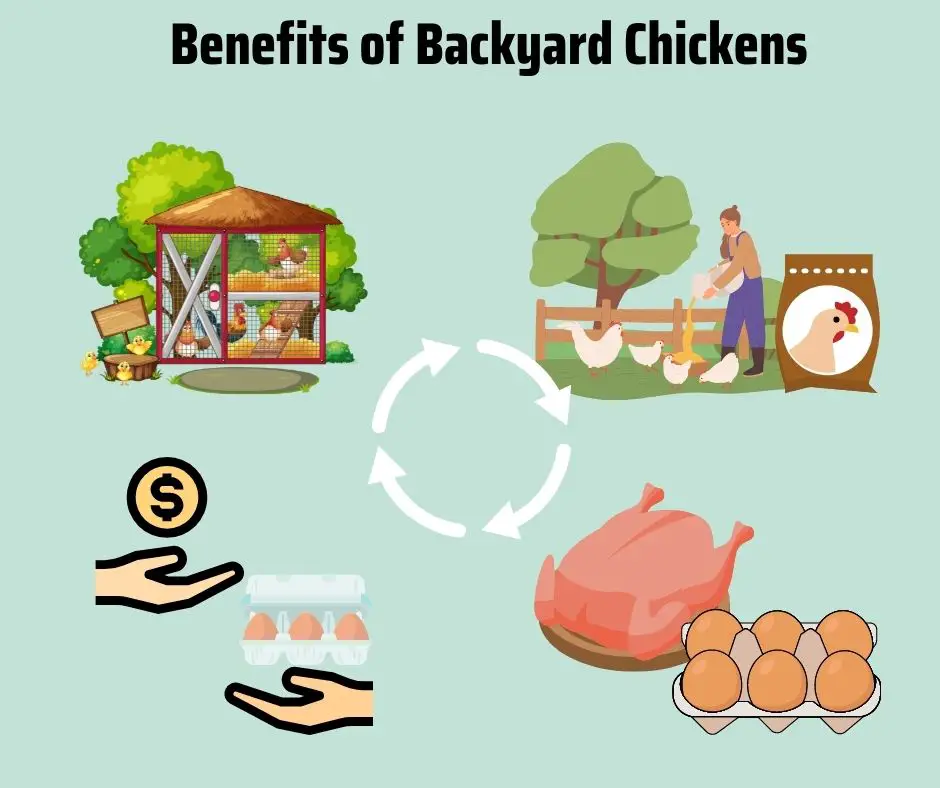
If your backyard chickens are laying enough eggs, you can save money by not buying them from a food store. In fact, you can sell the excess to earn money. So, raising backyard chickens is both cost-saving and a source of income.
But is it worth raising chickens for eggs? The response is a big YES! It is cost-effecting raising backyard chicken, especially if you opt for free-ranging. Chickens raised that way always forage for food and are good to go with small amounts of supplements.
Lastly, chickens are a readily available resource and suit any off-grid lifestyle.
Raising Backyard Chickens for Eggs: How to Get Started
Getting started with backyard chicken keeping is straightforward. But you should know a few things beforehand. The knowledge of collecting, storing, and using eggs is a prerequisite.
You also need to understand the risks and how to mitigate them for successful backyard chicken keeping.
Consider the following factors to get started raising backyard chicken:
Understanding Local Laws for Raising Backyard Chickens
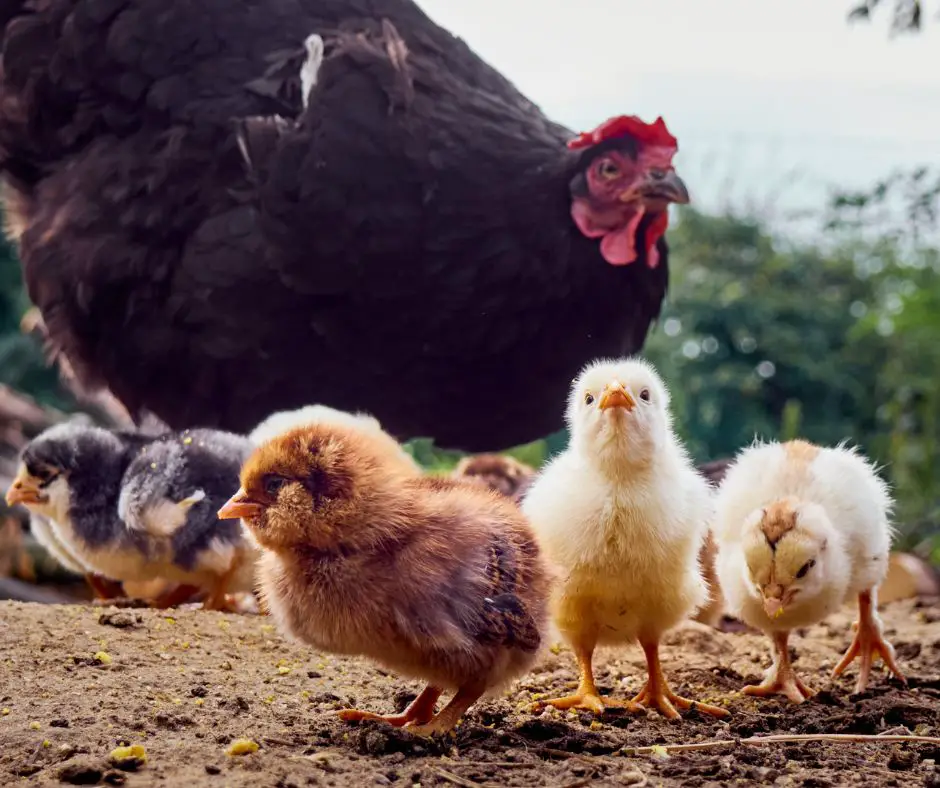
Raising backyard chickens if you live in the countryside is fully permitted by law in most states. However, it is not that direct when you live in urban areas.
Municipalities and local authorities have different laws that ensure everyone lives in peace with neighbors. Those laws also regulate where backyard chickens can be raised and the number you can have on your property.
Chicken can be noisy, and their droppings can produce a stench smell if not well managed. These factors may cause discomfort to your neighbors, who won’t hesitate to raise complaints about your little chicken farm.
Check your state laws to ensure you are on the safe side. Remember, laws about keeping chickens vary from town to town, state to state, or country to country. For instance, a region can set a limit to only 4 chickens. Ensure you comply to avoid nuances from your neighbors and authorities.
Choosing the Correct Breed of Chicken
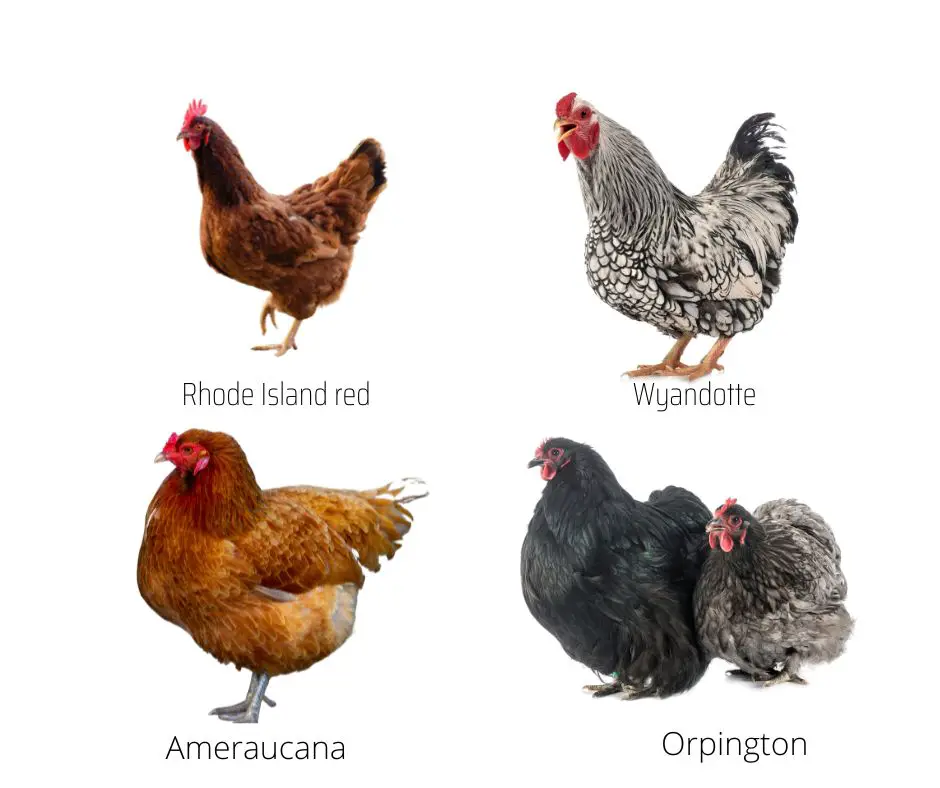
Different chicken breeds exist. Some are best for laying eggs, meat, or both. In this case, you need good layers because you are to raise them for eggs. But again, you have different options to choose from.
The chicken breed you choose depends on many factors, including the climate. Some are adapted to hot environments, but others perform best in cold areas. However, we have some famous names you can consider.
The chart below shows the most recommended chicken breeds you can consider raising in your backyard.
| Breed of chicken | Best for | highlights |
| Rhode Island red | Both eggs and meat | – Easy to raiseHeat tolerant – Dual-purpose breed – Lays large 200-300 eggs per year – Average weight: Roosters: 8 ½ lbs, Hens: 6 ½ lbs – Relatively noisy – Great foragers and predator-savvy – Prone to broodiness – Relatively long lifespan (5-8 years) – Active but also docile and calm – roosters can be aggressive. |
| Wyandotte | Both eggs and meat | – Great for beginner – Suitable for hot and cold climates – Produces large eggs (3-4 eggs per week)Calm and gentle personalities – Excellent foragersBelow average noise level – can get noisy – Excellent layers – up to 300 eggs per year16-20 weeks to maturity and live for 6 years – Average weight: Roosters: 8 ½ lbs, Hens: 6 ½ lbs |
| Ameraucana | Dual purpose | – Lays up to 250 eggs per year. – Average weight: Roosters: 6 ½ lbs, Hens: 5 ½ lbs – Good foragers and very fertile. – Does well in a wide range of environments but is best for cold regions. – Lays medium-sized light-blue eggs. – Relatively quiet and docile. – Lives longer – 7-8 years. |
| Orpington | Both eggs and meat | – Average weight: Roosters: 10 lbs, Hens: 8 lbs – Big and fluffy with a long lifespan (8+ years) – Quiet and docile. – Great moms for chicks. – Excellent foragers – Lays medium-to-large 3-5 eggs per week (150-250 eggs per year) – Best suited for cold climates and not hot environments. – Overweight ones suffer from prolapse and egg binding. – High maintenance birds. |
Is it necessary to have a rooster? You can choose to have a rooster or not. Hens do not need a rooster to lay eggs you intend to eat or take to the market.
But if you want fertilized eggs to hatch into chicks, you need a rooster. You can have one rooster for every 10 hens you raise, but this ratio can also vary depending on the breed of choice.
Roosters can be noisy. So, check the state or town laws if a rooster is permitted before you add one to your flock.
The final tip is to buy mature chickens for your first flock. This approach is more expensive but has a high success rate. Caring for young chicks can be challenging in the backyard without their mother. People often lose all the initial chicks or have a low success rate.
Plan For Scale
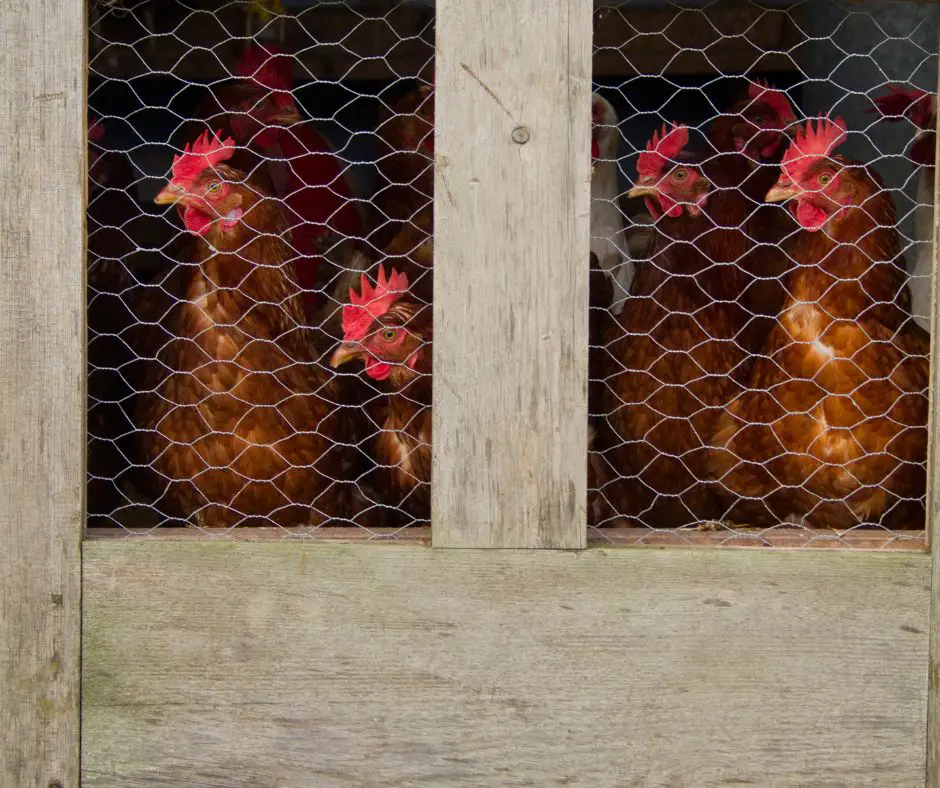
The size of your backyard does not determine the chicken breed to acquire, but it does influence the size of your flock. An overcrowded chicken coop and small runs can lead to health issues and encourage other vices.
You might see an increased rate of cannibalism, bullying, and egg-eating. All these vices lead to low egg production.
You should scale your flock appropriately. Consider the available space, the number of eggs you need, and your budget to know the number of chickens to raise. Ensure your birds are comfortable and peaceful with each other for maximum production.
Raise Backyard Chickens for Eggs: Complete Guide
Raising backyard chickens is very easy if you know what it takes. Chicken coop and run are a necessity, but you need additional items such as nesting boxes, feeders, and waterers, among other things. Also, you should know how to care for your backyard chicken and keep them healthy.
This guide has detailed information about everything you should know about raising backyard chickens. Let’s dive right in!
House for Backyard Chickens
First thing first, you need to protect your chicken from predators. Also, they need shelter when mother nature brings storms, rain, cold, or excess heat. These situations explain how crucial a chicken coop is to your flock.
Some off-gridder even share their living spaces with their chickens, but we prefer building a separate structure for them.
Location of Chicken Coop
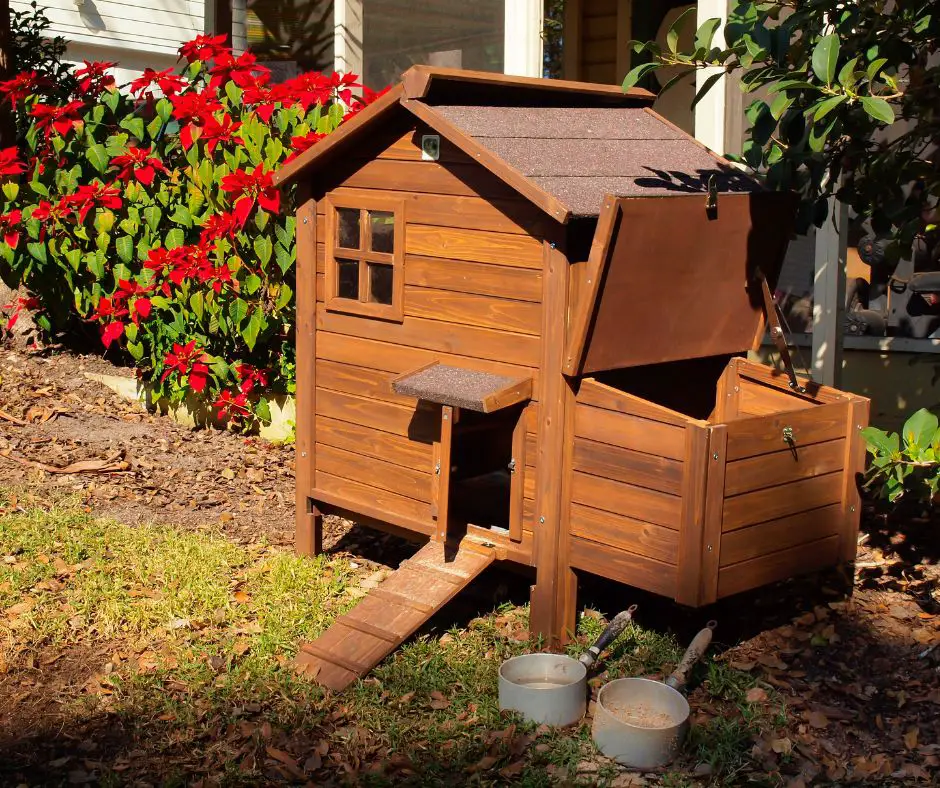
A chicken coop is not an ordinary structure. Much goes into its design and location on the property. You don’t just build it anywhere but in a place with a mix of sun and shade since chickens are heat and cold sensitive.
You should consider the climatic conditions of your region to choose the best location for a chicken coop. If your area experiences hot summer, the structure should be under a shade to keep the birds from raging summer heat.
Similarly, you should protect the birds from the extreme winter cold, rain, or storm. Locate the chicken coop in an area with an all-year-round cover. Also, ensure the draught does not directly get into the structure.
Sizing Chicken Coop

The next step is sizing the chicken coop. A small one is portable and cost-effective to build, but it may not be the ideal choice for raising a large flock. The golden rule is to give every bird at least 2 square feet of floor space in the coop and 10-sq-feet in the run.
Your production will be high if your chickens have space for shelter, exercise, and foraging. That’s why you should provide roosts in the coop. You need about one lineal foot of roost per bird to keep them happy.
Adding Roosts and Bedding
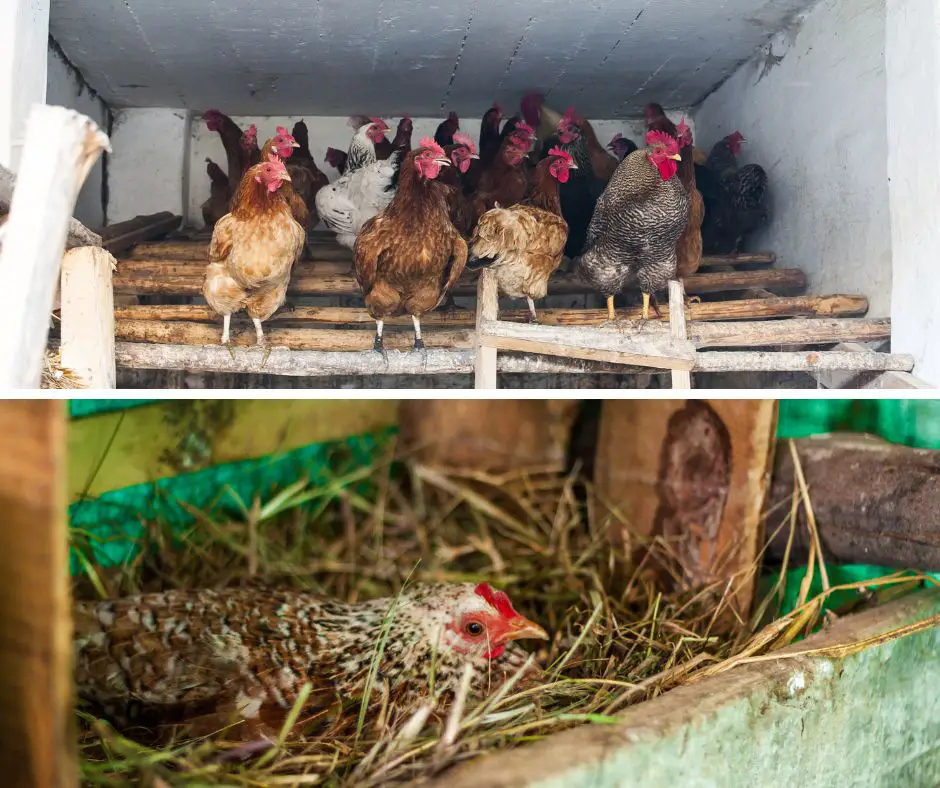
The roosts should be about 2-3 inches in diameter to allow chickens to grip them easily. The roost heights should also vary if you keep birds of different age groups. The lowest one should be 2-inches above the floor, and the subsequent one has an additional height of 2 inches. The tallest roost can be 3 feet high.
Lastly, the chicken coop should be insulated and ventilated to avoid the build-up of ammonia gas from their droppings. Also, clean it regularly and provide fresh straw bedding for warmth and comfort. These should be replaced to avoid the build-up of parasites and diseases.
Food and Water for Backyard Chickens
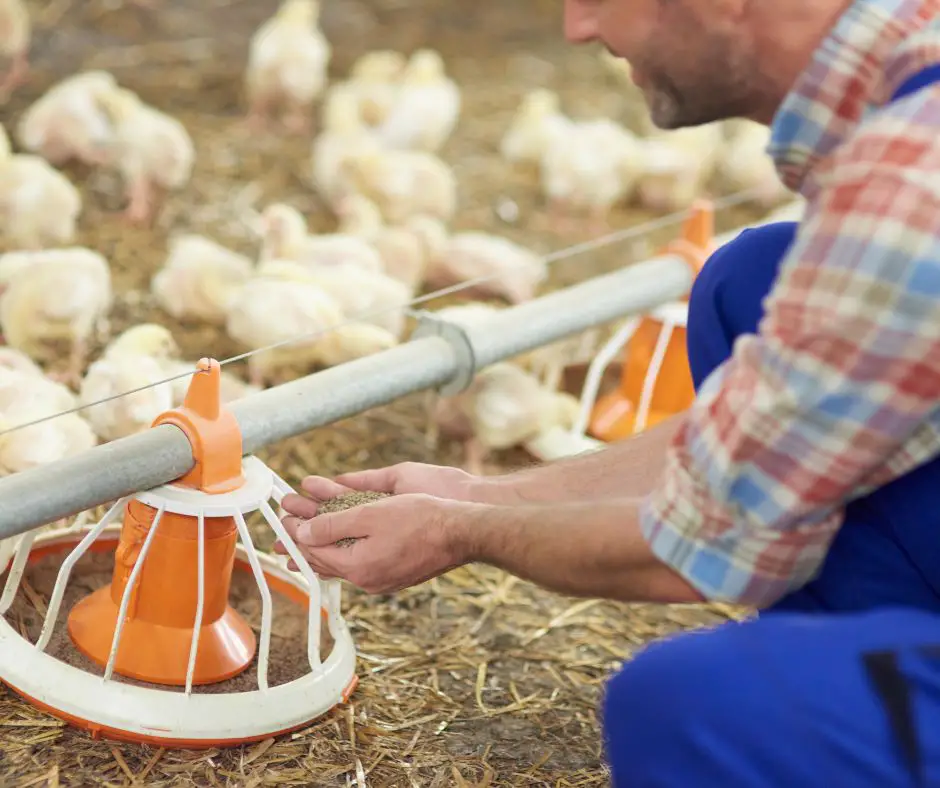
Backyard chicken breeds are usually excellent foragers, but you should provide extra food. You don’t need to cage them because they enjoy eating grains, fruits, vegetables, bugs, and worms in the field.
However, your backyard chickens may not get enough food in the field. For maximum production, provide supplemental feeds.
Fortunately, you don’t have to buy commercial feeds. You can use grains or chicken leftovers, but avoid those that can potentially poison your birds. Green potato peels, undercooked or dry beans, and avocados are not safe for birds.
Keep food and water away from perches and roosts to avoid soiling. Use appropriate feeders and waterers and hang them from the ceiling at the best height for your chickens.
Manna Pro Chicken Waterer
- 2 GALLON POULTRY DRINKER - Harris Farms Double Wall Galvanized Metal Poultry Drinker is crafted with heavy duty galvanized steel and features rolled edges for added safety and carry hanger handle for convenience
- FOR SMALL TO LARGE FLOCKS - Harris Farms 2 Gallon Hanging Metal Chicken Waterer accommodates up to 51 poultry or game chicks; Great for mixed flocks and features a visible locking device and roost-prevention top
- CONSTANT WATER FLOW - Double wall creates vacuum process for a constant automatic flow of water; Inner tank features a brass valve and rubber sealing washer for positive shutoff
Layers should be on a different diet to lay more healthy eggs. Supplement their food with calcium, such as limestone, if that is not already formulated in their food. Additionally, provide insoluble granite grit 2-3 days per month to encourage digestion.
Most backyard chickens are ready to start laying at 18 weeks old. At that point, feed 14-16% protein to prepare them for egg production. Once they start laying, ensure their food has at least 3.5-4.0% calcium.
Manna Pro Layer Pellets for Chickens
- USDA ORGANIC & NON-GMO: Manna Pro Organic Layer Feed is both USDA Organic and Non-GMO certified
- PELLET FORM: Easy to feed pellet form that helps eliminate waste and is suitable for both chickens and ducks
- CRAFTED FOR LAYING HENS: Nutritious and complete feed for laying hens 16 weeks and older
Caring For Backyard Chickens
Backyard chickens are under constant threat from predators, parasites, and diseases. It is up to you to ensure they are healthy and happy for maximum egg production. Any form of distress in birds can significantly affect their performance.
First and foremost, ensure proper lighting and ventilation in the coop. Extended daylight encourages egg production. And as mentioned, the chicken coop requires adequate air circulation to avoid ammonia accumulation. Use the best designs for the structure.
Deterring Predators
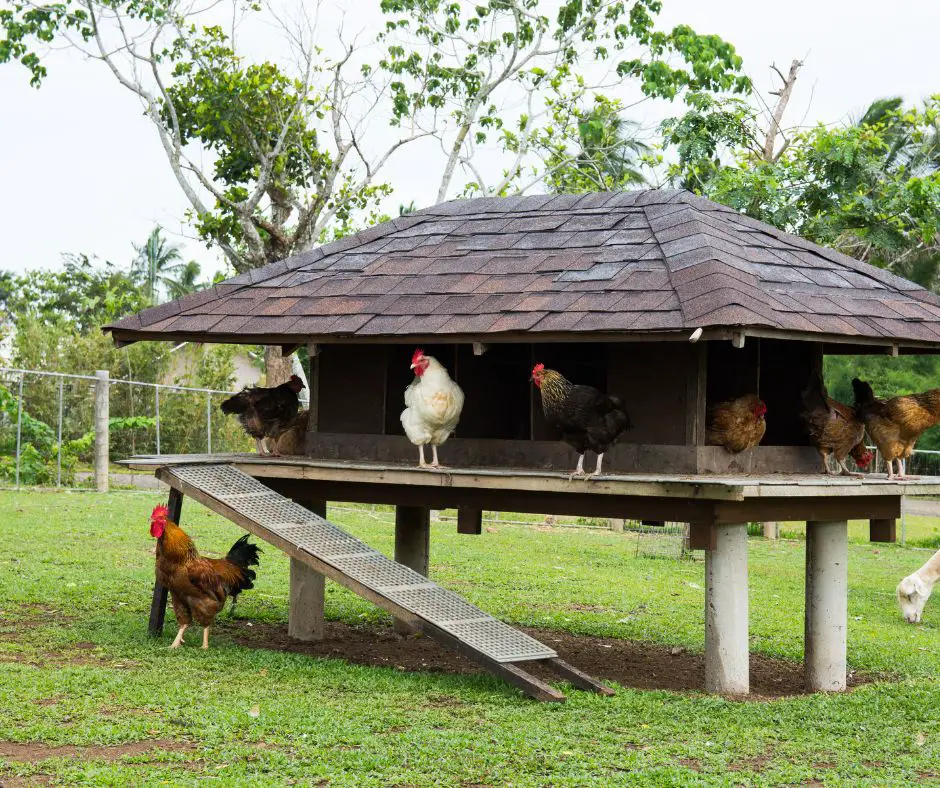
Rats, raccoons, snakes, and other predators should not access the chicken coop. Secure all openings and vents with a ¼-inch hardware mesh. Some rodents can access it from underground. To avoid that, dig a 12-inch trench around the coop and bury the same hardware mesh to act as a barrier.
Racoons, mink, and bears are aggressive predators. Install metal latches that require dexterity to open to keep them off from your chicken coop and run entrances.
Keeping Backyard Chickens Disease-free
Most backyard chickens can resist parasites and disease but are not immune. They also require veterinary care when they are infected. And to reduce disease prevalence, clean and occasionally disinfect their coop.
Use clean waterers and feeders, and don’t mix flocks to discourage disease spread. Don’t share equipment or items with neighbors also for the same reason.
Monitor the behavior of your chickens. Healthy birds are usually active and amusing to watch. They spend most of their time pecking, scratching, and clucking. These activities stop when diseased or stressed. They turn gloomy and may refuse to eat. Take immediate action when that happens.
Train Your Chickens
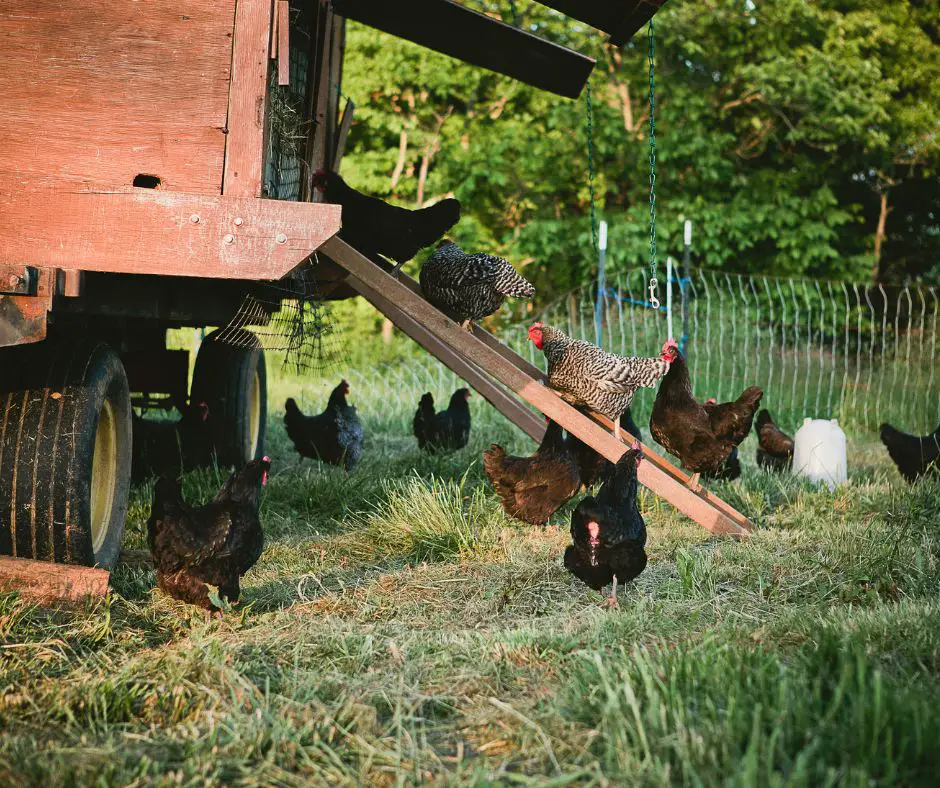
Most backyard chickens are free-rangers. They are happy if they run around chasing bugs and other things and not being caged. So, ensure your birds get out during the day to forage and exercise before returning to the coop at night.
You also have to ensure your chickens are not under any threat when exercising outside. Aerial attacks are the most prevalent during the day. So, it pays to have a cover over them or stay close to respond on time.
Nesting Boxes for Backyard Chickens
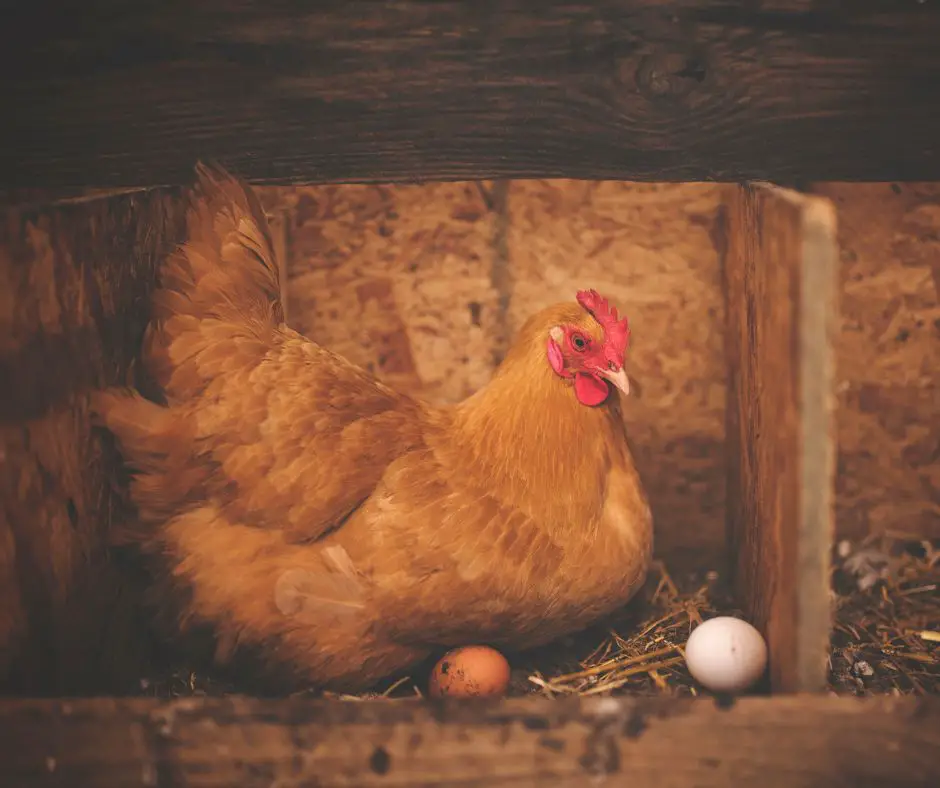
Precision Pet 7029288 Triple Nesting Box
- For Use In Or Out Of Coops
- Helps Eliminate Nest Sharing
- Single, Double, & Triple Nesting Boxes Are Available
Birds require safe nesting boxes where they can lay their eggs. Your first flocks will be ready to lay eggs at about 18-20 weeks old. That should find you with correctly sized nesting boxes.
An appropriate nesting box measures about 12-15 inches long and wide and 12 inches deep. You need one for every 4-5 hens.
Place your nesting boxes away from roosts and perches. Your hens need privacy to lay. So, don’t forget to give them that.
Lastly, remember to provide soft beddings in the nesting boxes and keep them clean.
Manure Management for Backyard Chickens
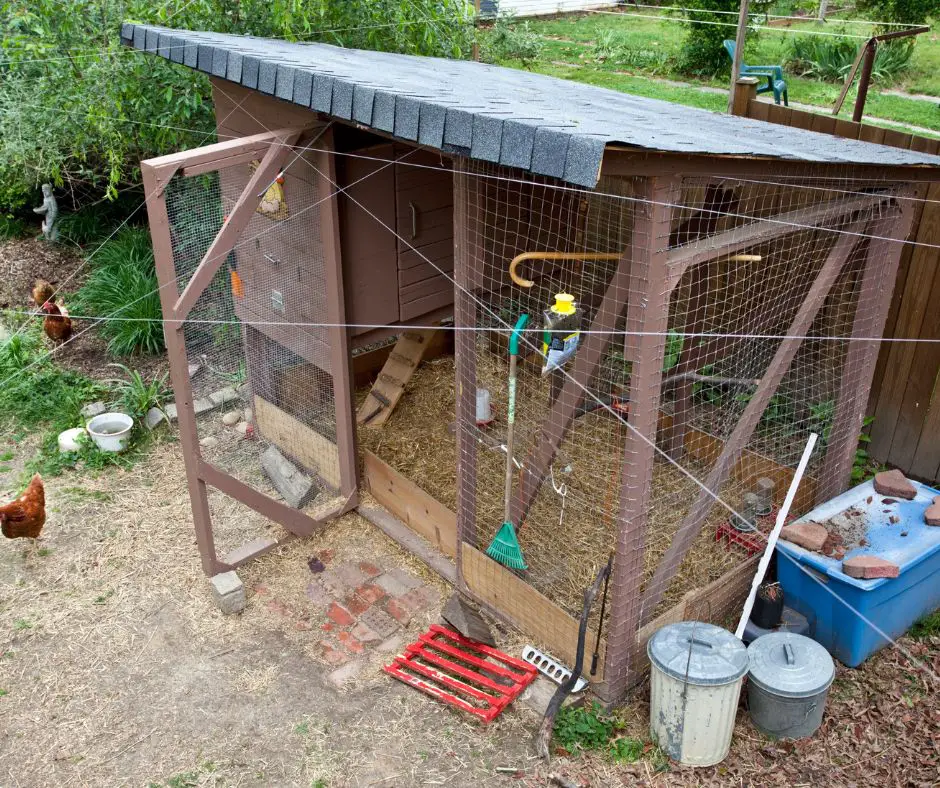
Chicken waste is excellent compost manure for your garden. However, you should not apply them directly to your vegetables or flowers. Uncomposed chicken droppings are rich in nitrogen that can burn your plants.
Regularly remove waste from the chicken coop and treat them away from the structure. Add it to a compost pit and cover it with chicken beddings. Give them enough time to be ready for use for fertilizing your plants.
However, composting chicken waste or pasturing chickens should not be done in a Resource Protection Area. But if you have large quantities of composted chicken waste, take a sample to the laboratory for testing and analysis of the nutritional content.
Use them according to the recommendations of the specialists to avoid side effects.
When Do Chickens Start Laying Eggs?
The time chickens start laying eggs depends on the breed. Most backyard chicken breeds lay eggs between 18 and 20 weeks old.
Also, the color, size, and how often the hen lays depend on the breed. Most eggs are brown-shelled, but some can be whitish or pinkish.
Most hens can lay 3-5 eggs a week. That translates to about 150-350 eggs per year. Once again, egg production capacity depends mainly on the chicken breed. Other factors, such as weather, feeds, diseases, and parasites, can also affect production.
How to Collect Backyard Chicken Eggs
The best time to collect eggs is every morning, late in the evening, or after feeding. You will know that your hens have laid if they are crackling loudly. You can also collect your eggs at that time if you are available.
Collecting eggs from nesting boxes is straightforward. You can transfer them directly to egg trays or gather them in a basket, cloth sling, or any other container with enough room. What you should avoid is applying pressure on the eggs. Their shells are fragile!
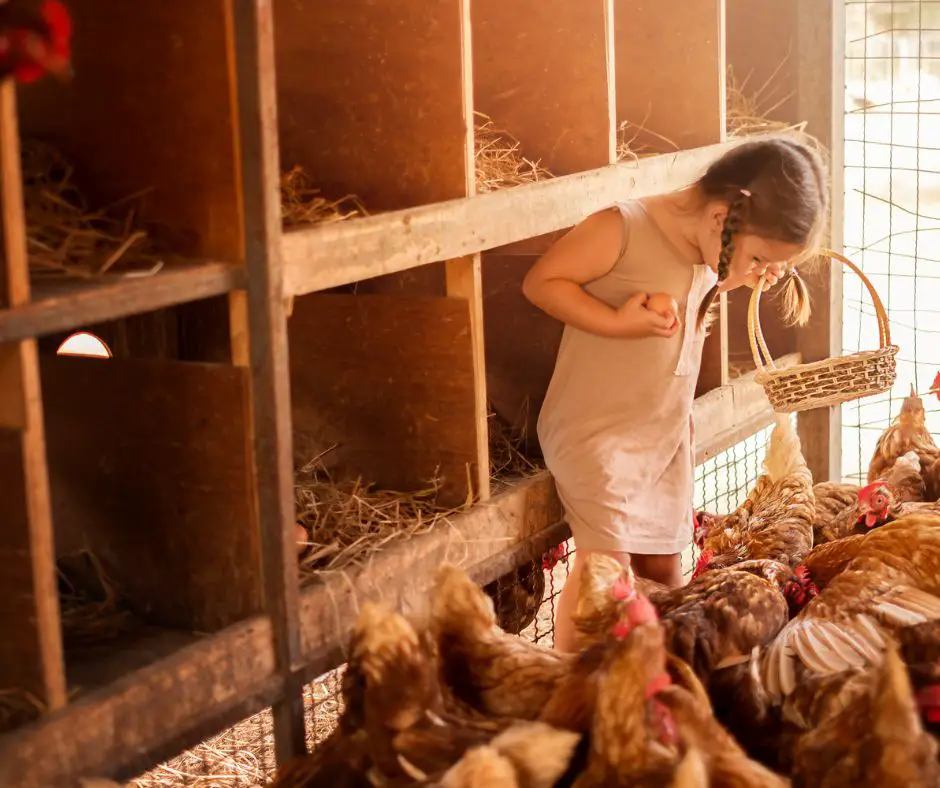
Cleaning and Storing Backyard Chicken Eggs
Avoid washing eggs if you don’t intend to use them immediately. It reduces their shelf life. Wipe with a dry towel if the eggs are visibly soiled. Alternatively, you can use a damp cloth to remove any manure in them.
You can submerge eggs in lukewarm water if they have stubborn stains to soften them. Wipe and air-dry before arranging them in crates for storage.
Freshly-laid clean eggs can be stored directly in the pantry at room temperature without washing. They can remain fresh for many days or a couple of weeks.
You can also refrigerate eggs at 32-40 degrees Fahrenheit for longer shelf life.
When storing eggs, arrange them in the crate such that the rounded end points upward and the other pointy end downwards. The rounded end has an air space that provides insulation, thereby reducing evaporation and moisture loss.
Long Life of Backyard Chickens Eggs
The shelf life of eggs varies, depending on whether they are washed, cooked, or not and how they are stored. Unwashed eggs stay fresh longer than washed ones because they still have cuticles intact. The cuticle is a thin layer on the eggshell that keeps air and bacteria out of the egg.
Unwashed eggs have a shelf life of 6 months or more when stored in a refrigerator. Washed ones have a reduced shelf life of 4-5 months, similar to store-bought eggs.
Unwashed eggs stored at room temperature stay fresh for about 3-5 weeks. Expect them to spoil sooner if you wash them.
Freshly-laid eggs last the longest when frozen. If you use an appropriate procedure, your frozen eggs can stay fresh for a whole year.

Signs of Bad Egg or Good
When an egg spoils, it changes in color, smell, and density. You can use these factors to determine the state of your eggs.
Some eggs smell rotten, and the yolk turns grayish or black instead of pure yellow. But you can only realize it after breaking the egg. What can you do to know an egg is spoiled?
You can use a simple water test. Fill a large glass or bowl with fresh water and put an egg in it freshly-laid eggs will sink to the bottom while the spoiled ones remain afloat.
Eggs that are a few eggs may be partially submerged or remain suspended in the water. These are still considered safe for human consumption.
Using Backyard Chicken Eggs
How can you benefit from your backyard chicken eggs? You can use them differently, which includes cooking, hatching, or selling. Eggs from backyard chicken are edible, delicious, and nutritious.
You can incubate eggs but only choose the fertilized ones. Don’t think about it if you don’t have a rooster in your flock. And even if you have, you can still have a few unfertilized eggs. These ones won’t hatch even if the conditions are right.
Before incubation, candle all eggs collected to determine if they are fertilized or not. Do that about 7-10 days after they are laid. It is the right time to incubate eggs and positively identify fertilized ones during candling. Fertilized eggs show a network of veins under the light.
If you have a broody hen, you can let her incubate the eggs under her wings and worry not about the conditions. But if that is not an option, you can buy an incubator that suits your budget or improvise one.
Maintain the incubation temperature between 99- and 100 degrees Fahrenheit. The maximum allowed fluctuation is 2 degrees Fahrenheit on either end. The temperature should, however, not remain at these extreme points for long. Also, remember to regularly turn the eggs if the incubator does not do it automatically.
Brinsea Products Mini II Advance Automatic 7 Egg Incubator
- Exceptional Visibility & Capacity: Versatile clear dome design offers outstanding visibility for monitoring eggs and hatching chicks, accommodating 7 standard chicken eggs with the included insert or 12 small eggs with an optional insert
- Precision Controls: Designed for simplicity, this egg incubator features intuitive menu-driven controls including temperature, automatic egg turning with auto-stop functionality, and countdown timer making it easy to start hatching eggs
- Enhanced Safety Features: Equipped with a room temperature alarm and high/low temp alarms, this bird egg incubator ensures optimal conditions, providing peace of mind for healthy embryo development and successful hatching
Risks from Backyard Chicken Eggs
The most common risk of backyard chicken eggs is salmonella. This causes diarrhea, fever, and stomach cramps, which take from 6 hours to 6 days after infection to be seen. Fortunately, salmonella is not life-threatening. The symptoms should go away after 4-7 days.
You don’t need antibiotics to treat salmonella infection. If you have diarrhea, take a lot of fluid and drink as much water as possible to rehydrate. Salmonella rarely enters the bloodstream. But if it does, it can be life-threatening. Fortunately, there is nothing much to worry about because the risk is very low.
Avoid Risk from Raising Backyard Chickens
How can you stay safe from the risks of eggs from backyard chickens? The only thing you can do is to keep proper hygiene in and around the chicken coop and care for the eggs to avoid contamination.
Caring for Chicken and Hencoop
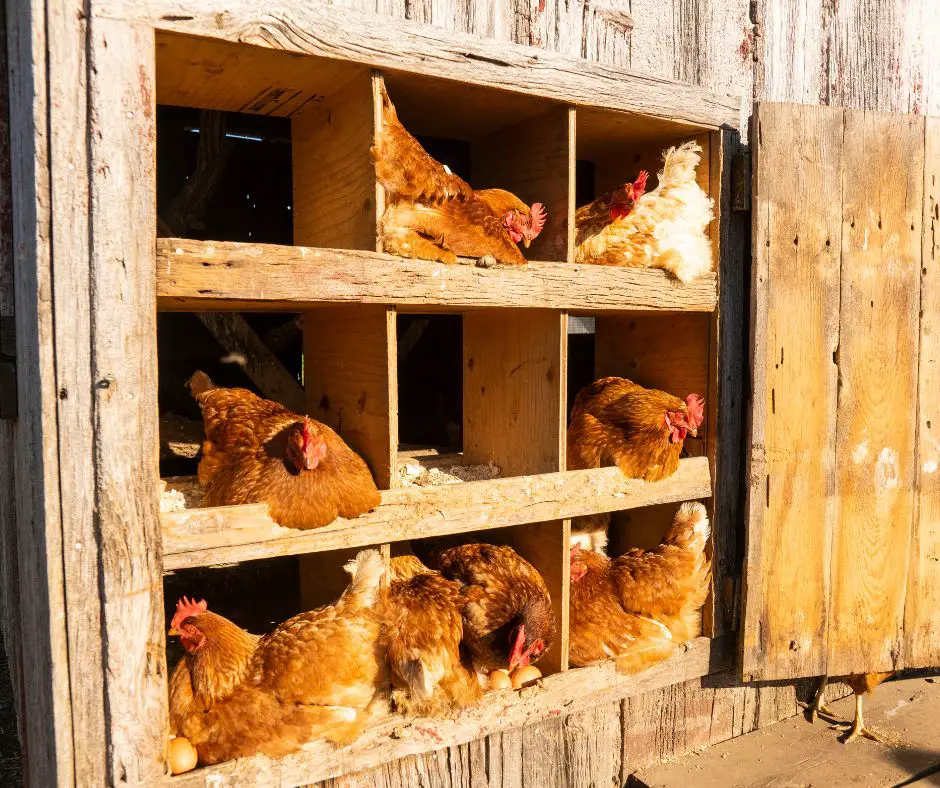
Observe the following routine to keep the chicken coop clean to minimize the risks:Chicken nest with hensObserve the following routine to keep the chicken coop clean to minimize the risks:
- Keep the nest box clean to ensure your eggs are also clean!
- Clean the chicken house and keep the floor dry and free from litter, except for clean bedding.
- Clean nest boxes once a week and change nesting material.
- Store feeds appropriately to prevent contamination.
- Regularly clean feeders and waterers in a clean environment and disinfect them if possible.
- Ensure your eggs are clean by providing sleeping roots above the height of nesting boxes. That will discourage the hens from sleeping and pooping in the nesting boxes.
- Compost chicken waste at an appropriate temperature to kill harmful bacteria before being used to avoid possible infection.
Caring for Eggs
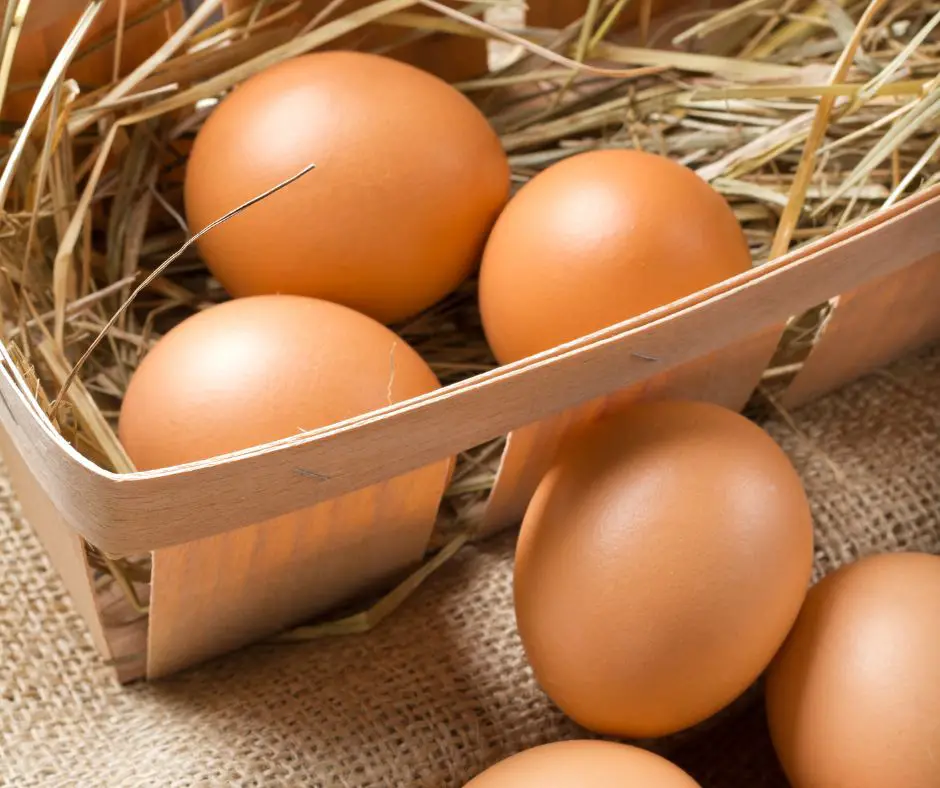
You should keep your eggs from contamination through proper handling and storage. Consider doing the following:
- Maintain daily egg collection
- Discard abnormally shaped eggs or those with spots, cracks, or other irregularities.
- Cook eggs well at the right temperature. Ensure both the yolk and white are firm, which happens at an internal temperature of 160°F (71°C) or hotter.
- Use pasteurized eggs to make foods with raw or lightly cooked eggs.
- Use or refrigerate eggs and foods containing eggs soon after cooking. Refrigerate them within 2 hours or 1 hour if exposed to high temperatures above 90 degrees Fahrenheit.
- Wash your hand and any other item that comes into contact with eggs using soap and running water. The additional items include countertops, utensils, dishes, and cutting boards.
- Do not eat raw eggs or any food recipe with raw eggs before cooking, such as cookie dough or cake.
| Type eggs | Store Refrigerator(40 °F or below) | Store Freezer(0 °F or below) |
| Raw eggs in shell | 3 to 5 weeks | The yolks and whites of hard-boiled eggs should be beaten together before being frozen. |
| Raw egg whites and yolks | 2 to 4 days | 12 monthsNote: Yolks do not freeze well |
| Raw egg accidentally frozen in shell | It’s essential that you use immediately after thawing | Keep frozen, thenrefrigerate to thaw.Note: remove any frozen eggs with a broken shell |
| Hard-cooked eggs | 1 week | Do not freeze |
Preparation Right Way
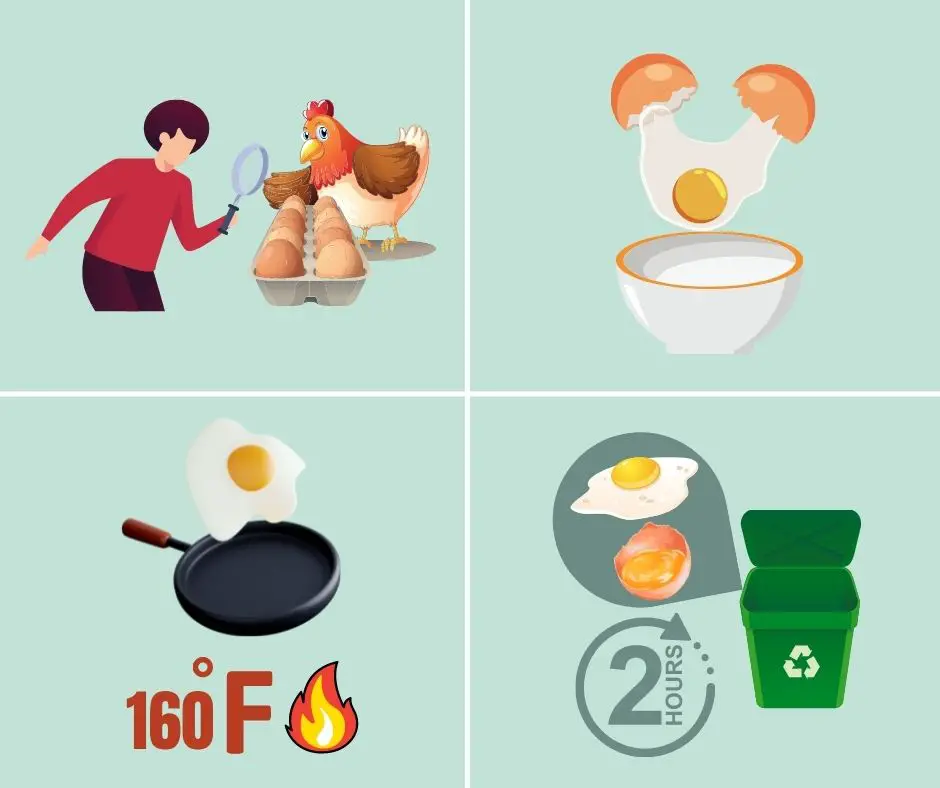
Proper egg preparation can help reduce the risks of eating eggs from backyard chickens. But how do you do it? Consider the following:
- Inspect eggs for any cracks and avoid ones with cracked shells.
- Crack eggs in a bowl and inspect it further. Discard it if you realize any defects. Those with blood spots on the yolk are safe for human consumption.
- Always cook eggs before eating. A recipe with eggs as an ingredient should be cooked to 160 degrees Fahrenheit, as shown by the food thermometer.
- Discard any raw or cooked eggs left at room temperature for two hours or more.
For Yourself
Personal hygiene can also help reduce the risks of eating eggs from backyard chickens. Always wash your hands with soap and clean water after handling eggs, chickens, or anything items used in the process.
Lastly, don’t wash chicken feeders and waterers in your kitchen sink.
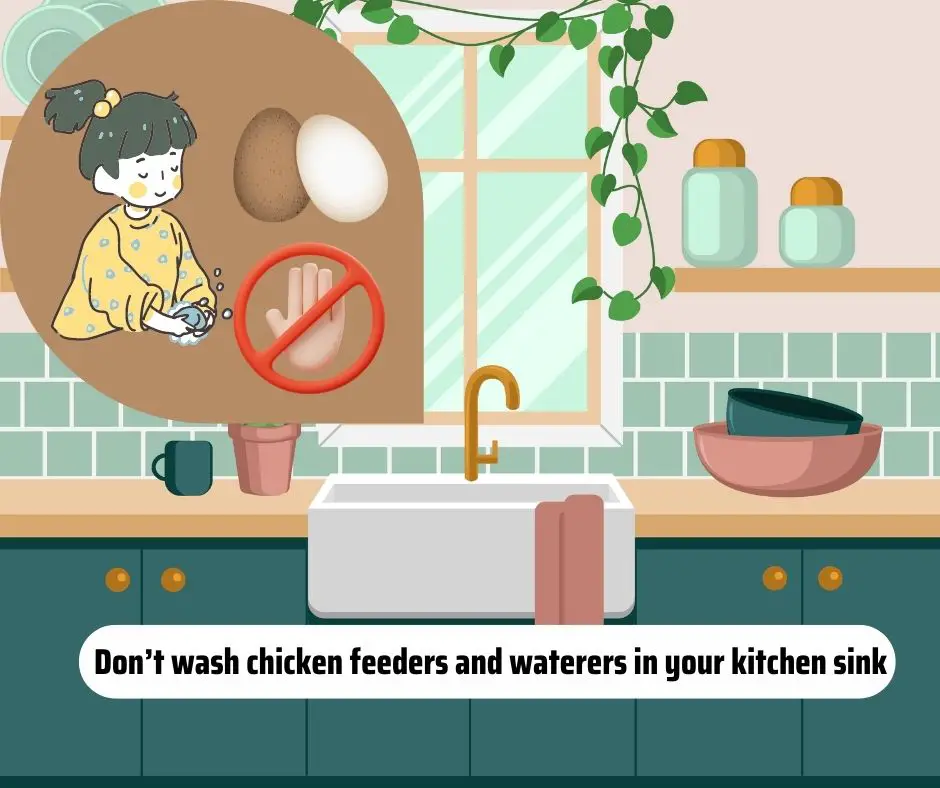
When Do Chickens Stop Laying Eggs?
The lifespan of chickens varies, and that affects when they stop laying. Some breeds can only live for 5 years. So, expect them to stop laying eggs just before that. Others can live for more than 8 years. They, therefore, will continue laying eggs for more years.
What to Do When Your Chicken Stops Laying Eggs
Most backyard chicken breeds are dual-purpose. That means you can slaughter them yourself for meat or sell it. However, that should only happen after testing and confirming the chicken is healthy. Do not slaughter any diseased bird.
Personally Thinking
If you can’t find a place to keep your chickens or your local laws do not yet permit the practice, try petitioning for permission. You may need some convincing arguments in order not only permits but also public support! It is the least you can do for yourself and generations to come.
Some Thought
You can raise backyard chickens for their eggs, which you can eat, hatch, or sell for money. The process is not complicated. And provided the state or city laws allow it, you can go into raising chickens with little or no experience. The information in this article is all you need.
Thank you for reading this article at Em Offgrid. We appreciate your time and hope you have the information you were looking for. Kindly share it with your friends to help us reach more people!
